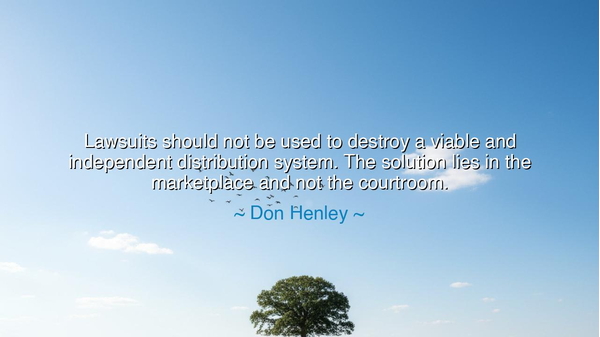
Lawsuits should not be used to destroy a viable and independent
Lawsuits should not be used to destroy a viable and independent distribution system. The solution lies in the marketplace and not the courtroom.






The words of Don Henley, “Lawsuits should not be used to destroy a viable and independent distribution system. The solution lies in the marketplace and not the courtroom,” are spoken with the urgency of one who has seen the weapons of power misused. In this saying, Henley warns that the sword of the law, once drawn, can be turned not toward justice but toward domination. He points to the danger of mighty corporations wielding lawsuits not as instruments of fairness, but as tools to crush rivals and silence innovation. The marketplace, he reminds us, is the true battleground of competition, where merit, creativity, and service should decide victory—not the maneuverings of attorneys in distant courts.
The origin of this thought comes from Henley’s lifelong concern with fairness, independence, and the misuse of institutional power. Known to the world as a musician and founding member of the Eagles, Henley was also deeply engaged in issues of culture, environment, and industry. In the realm of music, the rise of new distribution systems—from independent record stores to digital platforms—often threatened the dominance of entrenched companies. Instead of competing honorably in the marketplace, some sought to crush these challengers with lawsuits. Henley’s words were born of this struggle: a plea that innovation and independence be judged by their value to the people, not strangled by the machinery of litigation.
History gives us a striking parallel in the story of Tesla and Edison during the age of electricity. Edison, seeking to protect his patents and his business, used every legal and public relations tool available to smear Tesla’s alternating current system. Lawsuits, propaganda, and influence were deployed to destroy an emerging and independent distribution of energy that threatened Edison’s empire. Yet in the end, the marketplace spoke louder than the courtroom. Tesla’s system proved superior and became the foundation of modern electricity. Henley’s wisdom echoes in this tale: progress survives not because courts bless it, but because the people embrace it.
The deeper meaning of Henley’s words is a defense of freedom and fairness. When the courts are used not to uphold justice but to suppress competition, society suffers. Creativity is stifled, small players are silenced, and the rich tighten their grip on the future. But when ideas are tested in the open air of the marketplace, truth reveals itself. The strong may falter if they fail to serve, while the small may rise if they bring value to many. The courts should exist to preserve order, not to dictate winners in battles that belong to innovation and enterprise.
Yet Henley’s saying also carries a warning to the people: do not expect the law to solve every conflict. The courtroom may decide disputes, but it cannot replace the will of the people expressed through choice, demand, and trust. To abdicate responsibility to judges is to weaken the marketplace itself. True accountability comes when individuals support independence and fairness with their own actions—choosing wisely, resisting monopolies, and defending those who bring honest work and creativity to the table.
The lesson for us is clear. In our lives and in our societies, let us not rely solely on laws to settle every question. Let us strengthen the systems of fairness, transparency, and competition so that truth may prevail on its own. When confronted with attempts to silence or crush the small through force or litigation, let us respond by supporting independence and innovation. For in the end, the marketplace is not only about commerce, but about the exchange of ideas, the flourishing of creativity, and the empowerment of individuals over institutions.
Therefore, let us live as defenders of fairness. Let us recognize the place of law, but not allow it to become the battlefield of domination. Let us cherish independence and resist the temptation to hand every struggle to the courts. Instead, let us trust in the strength of innovation, the wisdom of communities, and the freedom of choice.
So let Henley’s words endure as a guiding principle: “The solution lies in the marketplace and not the courtroom.” May they remind us that justice is not found in silencing competition, but in allowing it to breathe. And may they inspire us to build a world where fairness thrives not by force of law alone, but by the strength of creativity, the voice of the people, and the enduring power of truth.






AAdministratorAdministrator
Welcome, honored guests. Please leave a comment, we will respond soon